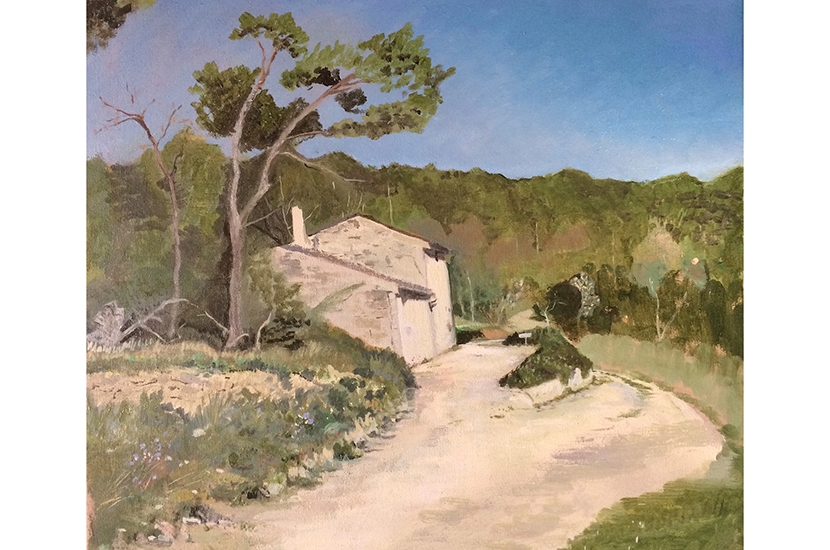In France the rule for going for a walk stipulates an hour in duration or a kilometer in distance. We are fortunate here in having a 40-minute circular walk that starts at the front door, most of it on a footpath, though beginning with a steep climb that makes me pant like a greyhound after a course. Then the path levels and runs pleasantly through olive groves and vineyards. One is never out of sight of houses and at three points along the route house dogs — in order: a pair of Weimaraners, a Jack Russell and a pedigree sheepdog — enjoy intimidating passers-by by throwing themselves in a frenzy of barking at the wire boundary fences containing them. Otherwise the route is bucolic and quiet enough to quieten the mind and exhaust the frail old mongrel.
In ordinary times this walk can be extended by an hour and a half, taking one away from human habitation and deep into the countryside. At the route’s extremity is an ancient stone vineyard-workers’ hut with a working fireplace, free wood, a long table and chairs. In this isolated and primitive home from home we’ve had many a lunch and have come to love the variety of views and scenes along the way. The route has a local name: le petit poucet or ‘little thumb’, after a popular French fairy tale. The hut is known locally as cabanon Sara.
The sun came out after a cold week of overcast skies. ‘Let’s do cabanon Sara,’ said Catriona. ‘I miss it.’ ‘But it’s more than a kilometer,’ I said. ‘No one will know,’ she said. ‘And it’s surely not much more than a kilometer — as the crow flies.’ ‘Three,’ I said. ‘And what makes you an exception to the rules governing everybody else?’ My poker face made a conscious joke of such breathtaking hypocrisy. Nevertheless it’s the line I’ve decided to take for the duration. In a country twice the size of Britain containing 60 million French, draconian emergency measures must be accepted as a voluntary affair for the good of all or they are chaff in the wind.
‘But we never see another soul on the petit poucet,’ said Catriona. ‘And it would do us good. A kilometer isn’t much of a walk.’ I said: ‘Supposing Toumani Diabaté, say, gave a free concert from the doorstep of cabanon Sara, the thousands who flocked out from Marseille to see him would have as much right to break the rule as you.’ ‘A ridiculous comparison,’ she said. ‘You’re turning a wish into a claim,’ I said.
The next day we argued from similar positions about garden centers. She wanted to buy seeds and couldn’t see why garden centers shouldn’t be open. Because it would unnecessarily complicate a simple, temporary, justified emergency rule, I said.
Catriona is correct: I am talking hypocritical nonsense. But it’s all right for her; she’s already had the Wuhan flu and probably has immunity. She had it back in late January, she thinks, very plausibly. Her chest was pretty bad, but she recovered. Her best friend, a health worker, thinks she has had the Wuhan flu too. Now she is back at work.
My joke punctiliousness, and fake communitarianism, is of course based on fear and self-interest. Last July a small piece of plastic tubing — a stent — was inserted in my urethra, just below my left kidney, to drain it. A uteric stent lasts about six months before it deteriorates and should be changed. Torbay hospital kindly offered two dates for the procedure but I couldn’t get to either. Yesterday a urologist rang me up to tell me I ought to try to have the stent changed over here in France, and pronto. French hospitals are naturally devoting their energies to thousands of coronavirus victims and are unlikely to offer to divert even a small part of them for the likes of me.
At the beginning of this lockdown three weeks ago, once I’d seen for myself that the shelves at the local Spar were bulging at the seams with produce, and the manager, Julian, said he wasn’t expecting any supply problems, my attitude was one of cheerful insouciance. I had a job I could do from home, books, good wifi, wonderful company, gin in the cupboard, and a pleasant country walk beginning at the front door that didn’t break any rules. I relished the prospect of a stationary two weeks or month. But this past week the rising figures, and the steep climb of the graph curve, and the virus’s defiance of analysis, and the apparent virulence of certain strains of it, and the economists’ uniform disquiet, and the unavoidable sense that a great social upheaval is in the offing, and the ache in my side — once intermittent and ignorable, now constant — has wiped the silly grin off my face.
This article was originally published in The Spectator’s UK magazine. Subscribe to the US edition here.

























